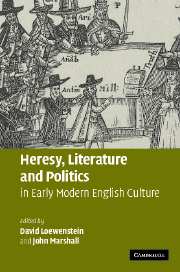Book contents
- Frontmatter
- Contents
- Acknowledgments
- Notes on contributors
- Introduction
- 1 Writing and the persecution of heretics in Henry VIII's England: The Examinations of Anne Askew
- 2 Anabaptism and anti-Anabaptism in the early English Reformation: defining Protestant heresy and orthodoxy during the reign of Edward VI
- 3 “Godlie matrons” and “loose-bodied dames”: heresy and gender in the Family of Love
- 4 Puritanism, Familism, and heresy in early Stuart England: the case of John Etherington revisited
- 5 A ticklish business: defining heresy and orthodoxy in the Puritan revolution
- 6 Thomas Edwards's Gangraena and heresiological traditions
- 7 “And if God was one of us”: Paul Best, John Biddle, and anti-Trinitarian heresy in seventeenth-century England
- 8 The road to George Hill: the heretical dynamic of Winstanley's early prose
- 9 Milton and the heretical priesthood of Christ
- 10 An Historical Narration Concerning Heresie: Thomas Hobbes, Thomas Barlow, and the Restoration debate over “heresy”
- 11 Defining and redefining heresy up to Locke's Letters Concerning Toleration
- 12 “Take heed of being too forward in imposinge on others”: orthodoxy and heresy in the Baxterian tradition
- Index
6 - Thomas Edwards's Gangraena and heresiological traditions
Published online by Cambridge University Press: 20 February 2010
- Frontmatter
- Contents
- Acknowledgments
- Notes on contributors
- Introduction
- 1 Writing and the persecution of heretics in Henry VIII's England: The Examinations of Anne Askew
- 2 Anabaptism and anti-Anabaptism in the early English Reformation: defining Protestant heresy and orthodoxy during the reign of Edward VI
- 3 “Godlie matrons” and “loose-bodied dames”: heresy and gender in the Family of Love
- 4 Puritanism, Familism, and heresy in early Stuart England: the case of John Etherington revisited
- 5 A ticklish business: defining heresy and orthodoxy in the Puritan revolution
- 6 Thomas Edwards's Gangraena and heresiological traditions
- 7 “And if God was one of us”: Paul Best, John Biddle, and anti-Trinitarian heresy in seventeenth-century England
- 8 The road to George Hill: the heretical dynamic of Winstanley's early prose
- 9 Milton and the heretical priesthood of Christ
- 10 An Historical Narration Concerning Heresie: Thomas Hobbes, Thomas Barlow, and the Restoration debate over “heresy”
- 11 Defining and redefining heresy up to Locke's Letters Concerning Toleration
- 12 “Take heed of being too forward in imposinge on others”: orthodoxy and heresy in the Baxterian tradition
- Index
Summary
In 1649, the London Puritan artisan Nehemiah Wallington noted, “A black cover book I did begin to write against the errors of these times, but because there were so many that hath done it far better than I can, I did give it over.” Amongst Wallington's many contemporaries, his fellow Londoner Thomas Edwards was the most prolific writer, and Edwards's Gangraena, published in three parts in February, May, and December 1646, the most notorious of the orthodox Puritan attempts to describe and denounce error, heresy, and schism, as parliamentarians struggled amongst themselves for control of godly reformation. Denounced by an anonymous critic as “the famous forger of these latter dayes,” and by John Milton as “Shallow Edwards,” one of the “New Forcers of Conscience under the Long Parliament,” Edwards has been controversial also amongst modern scholars. Whilst Gangraena has been copiously used as a source in the works of Christopher Hill and other historians of radical religion, Colin Davis, in particular, has denied that Edwards offers valid “depictions of the social and political realities” of his day; rather he is “a source of good evidence for the study of the mid-seventeenth-century heresiographer, of which he is virtually an archetype.”
This chapter takes up Davis's challenge to analyze Gangraena as heresiology or heresiography – a neologism derived from Ephraim Pagitt's 1645 book of that title. It discusses what it means to describe Edwards as a “heresiographer” and explores the influence of his avowed models, ancient and recent.
- Type
- Chapter
- Information
- Heresy, Literature and Politics in Early Modern English Culture , pp. 137 - 159Publisher: Cambridge University PressPrint publication year: 2006
- 3
- Cited by

